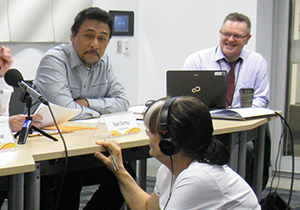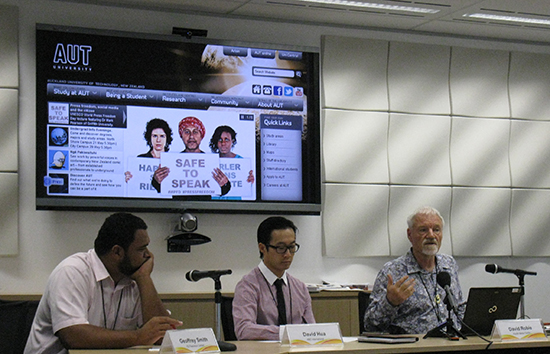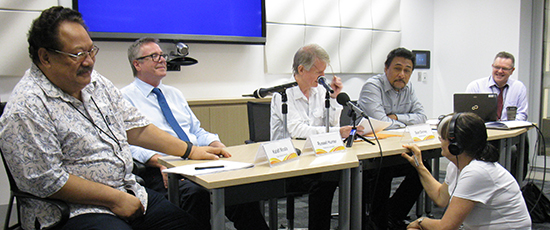
SYDNEY (Pacific Media Watch): The "human tsunami" of lifestyle diseases will overshadow climate change and other big Pacific economic stories for some countries, a regional conference has been told.
"The climate change story – while it is real and huge – will be overshadowed in Samoa by non-communicable diseases,” Talamua publisher Lance Polu said.
He described the crisis as an economic and health “human tsunami” at the two-day inaugural Asian Development Bank-organised Pacific business media summit in Sydney. Other speakers said the crisis also affected several Pacific countries, such as Tonga.
Diseases caused by a huge shift in lifestyle and diet has caused obesity, high blood pressure, diabetes, kidney failure and heart conditions, according to Polu who cited research reports.
"The heart of the problem is the shift in diet to a domination of imported processed foods like chemically grown chicken, fat-infested turkey tails, low-grade tinned fish, sugary fizzy drinks and much more,” he said.
"And we keep on importing them and returning only empty containers so they can fill up quickly and be sent back again to make our people even more sick and kill our productive populations at a very young age.”
Polu gave an example of the death from lifestyle disease in the past three months of two young Samoan chief executives of government ministries – one aged 45 and the other 50.
Bankruptcy risk
"The problem for us is so serious, some medical experts predict it will ultimately bankrupt our country in the near future,” Polu said.
We’re struggling to keep two dialysis units going to treat the number of kidney patients and the cost to the economy is enormous.”
Polu said the key was “information, public awareness and continuing education”.
"The media plays a hugely important and a vital role in this process to change attitudes and lifestyle. And it takes time and money.”
He called on the Pacific Islands media and ADB to consider a collaboration project on the issue because health had a major impact on sustainable growth in the region.
Taimi Media Network publisher Kalafi Moala of Tonga also talked about collaboration as a way for small Pacific news groups to pool resources and cited a three-week old new Tongan advertising alliance as an example.
Moala, who is also deputy chair of the Apia-based Pasifika Media Association (PASIMA), said collaboration was an important byword for media groups in the region.
Media friendly’
In a keynote address, Suva-based Pacific Islands News Association (PINA) president Moses Stevens called for a “media friendly environment” in the region through advocacy and education on the role of the media in business and politics.
Information was power, said Stevens, but in many rural Pacific societies, people had little access to media.
"In Vanuatu, where I come from, a lot of people in our rural society are not listening to Radio Vanuatu, let alone having access to television and newspapers.”
Stevens called on the ADB to make funding available to help the Pacific media sector to boost new ventures and to sustain established ones.
Among the 20 participating journalists, editors and media educators from eight countries, there were wide-ranging views about the “big stories” facing the region.
Climate change topped the anecdotal list along with corruption; social justice and human rights; resource extraction industries such as logging, mining and fishing; asylum seeker economic packages; and changing political climates, such as with Fiji preparing for a “return to democracy” election later this year.
Rights violations
Pacific Media Centre director Professor David Robie said the worsening human rights violations in West Papua were likely to also have a serious economic impact on ventures such as the giant Freeport McMoran copper mine after the presidential elections in Indonesia next month.
Indications are that elections could result in a leadership change that may be even worse for the people of West Papua,” he said.
Dr Robie praised Vanuatu Prime Minister Moana Carcasses Kalosil for the “only principled stand” over West Papua by a Pacific leader in recent months with his outspoken speech at the United Nations Human Rights Council.
Australia Network chief Pacific correspondent Sean Dorney singled out illegal tuna fishing as a major issue with a serious economic impact on the region, especially as some Pacific nations were “not pulling their weight” in regional surveillance.
Regional director Dr Andrea Iffland of the ADB said the media summit was a great success and it was likely that similar meetings could be organised in future.
Representatives from Fiji Television, Fiji Times, Matangi Tonga, Solomon Star, Taimi Media Network, Talamua Media Samoa, PNG’s National Broadcasting Corporation, Pacific Islands News Association, Asia Pacific Journalism Centre, Pacific Media Centre, and the Australian Broadcasting Corporation took part.
Senior Pacific media gather in Sydney to talk business


This work is licensed under a Creative Commons Attribution-NonCommercial 3.0 New Zealand Licence.




